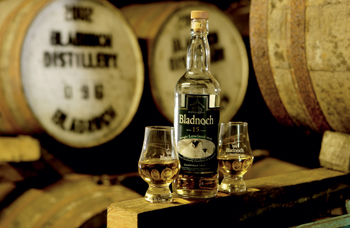Most MALT whiskies – even the big-name brands that boast their handmade, kilt-wearing credentials – are not what they should be. The average mass-produced malt whisky that you buy in Duty Free is made with zero passion by men in white coats staring at their distillery computers. Total brand uniformity is the name of the game. These whiskies are, of course, perfectly drinkable, but the stuff is invariably chill-filtered (which knocks the guts out of the whisky), then coloured with caramel and diluted. It is then packaged in a fancy tube and flogged at ruinous prices with a lot of spirit-of-the-glen marketing twaddle.
But whisky in its individual cask condition is virtually a different drink. It is utterly unmasked, at its own strength and with its own unique character. It is whisky for real men and women. Organisations such as the Scotch Malt Whisky Society offer special bottlings from selected casks. But have you ever thought of owning your own private cask, its individuality preserved – whisky the way God intended it?
Years ago I co-invested in a hogshead of Springbank, a real Rolls Royce of a malt from Campbeltown in the Mull of Kintyre. It is one of three survivors of a whisky town that once boasted more than 30 distilleries. I am now the proud owner of some 120 bottles of sublime 13-year-old malt. As a dram it’s not just good, it’s utterly ambrosial: a vanilla-tinted, creamy toffee, floral spirit that bursts in the mouth with every delicious sip. It is about 55 per cent alcohol, so I add a dash of Evian water to the glass to calm it down. I have learnt to chuck away the cork when I open a new bottle for guests after dinner as there’s never anything left by the end of the night.
Buying whisky en primeur is great fun and much of the fun is in the anticipation. If you are thinking of buying a cask as an investment, don’t. It’s an activity for whisky lovers, not City suits looking for a reliable financial return. Most individual casks are bought by informal syndicates of friends who want to share first-class whisky well under the price of bottles in the shops. Once the whisky is matured and you’ve paid the duty and VAT on it you can have it bottled or go to the distillery and roll the barrel to your car boot. It is great for giving away, too: you can put your godchild’s name on the label for a Christening present, or your own for home consumption. Sadly, Springbank no longer sells casks and neither does the vast majority of distilleries. But there are still some that do.
On the Hebridean island of Islay there are several distilleries (Laphroaig being perhaps the most famous) all known for their peaty, iodine character. Bruichladdich (“brook-laddie”) is in the south west of the island and does cask offers. The old distillery, with its Victorian machinery, had been mothballed by its previous corporate owner. It was bought up a few years ago by a private consortium led by Mark Reynier, a whisky-obsessed former wine merchant, who wanted to re-establish this classic, aggressively Hebridean malt of yesteryear. The multi-award-winning distillery and maturation warehouse are on the shore and the sea mist gets into the barrels and imparts a delicious, briny tang to a very lightly peated spirit. It’s an upmarket whisky for those who don’t like the dominant, rather Germolene flavour of the heavier Islay malts. On the other hand, if you do like monster Islay malt try the one-off Octomore distillation, the most heavily peated whisky in the world. It’s like quaffing a peat bog that’s been contaminated with rocket fuel, only rather more addictive.
The barrels Bruichladdich offers are imported casks from the Buffalo Trace bourbon distillery, lending the spirit a hint of Kentucky yee-ha as it ages. Among the cask owners is Andy Becalick, who set up a club of 30 or so fellow malt whisky addicts in the Basildon area where they stave off the winter gloom with ample supplies. “We’ve got six casks of five-year-old Bruichladdich between us.
“Some barrels have 20 owners, some six. We’ve spread the cost around and we’ve gone for hogsheads. You basically pay for the new spirit and the barrel. The cost of storage and insurance is included in the price for the first 10 years. When you bottle it you pay costs, labelling, bottling, duty and VAT. Duty depends on whatever alcohol percentage you bottle it at. So if you bottle it at the standard Bruichladdich percentage of 46 per cent then it works out at approximately £75 per dozen bottles. On top of all of that you pay 17.5 per cent VAT. The costs to us, we reckoned, are about £12.50 a bottle. Bruichladdich is willing to store some of your whisky in bond up there, so you don’t have to pay the duty until you are ready. One of our casks is already delicious and bottleable at five years, but we are going to keep going longer to see whether it gets better.
“We are starting to think about labels for the whisky. A group of us go up to Islay every year. But for us it’s not about the money – we haven’t tried to make a profit, we are not selling it and it’s all purely for enjoyment. The fun we have sampling the whisky with the locals is worth every penny.”
A regular visitor to Islay is Gordon Homer, an electrician from Newcastle. Gordon, a single malt fan, got his hands on the most prized of possessions – a blood tub, which Bruichladdich no longer does. “I adore whisky from the cask. It’s a completely different concept,” he says. I like to drink whisky at cask strength and if I want to put water in I do it myself.” When a storm prevented him getting to Islay to see his whisky being bottled, the folk at Bruichladdich used their webcam so he could watch the process from afar. Now the distillery is offering 100 casks of the first-ever distillation of a whisky it is calling Lochindaal, which uses peated barley of 55 parts per million. These casks cost £1,850 each and are offered on a first-come, first-served basis. Bruichladdich even has a whisky academy, so you can go and make the whisky that time will convert into your private supply.
Also on Islay is a tiny farm distillery called Kilchoman (“Kil-homan”). This farm distillery is the first to be built on the island for 124 years. The whisky making is part of the farming cycle with its own barley malting floor and everything steeped and kilned on site. The whisky, the makers hope, will become a toothsome, peaty dram with a monster finish. They were offering casks of new fillings but for a small firm a cask is a lot of whisky to let go of at once, so it now sells “futures” in bottles. However Johnny Turnbull, who has an estate in Argyll and runs stalking days, was quick enough to secure two casks. “I bought some because it sounded fun and I have a son who drinks whisky. I like Islay malts and it’s an interesting product.”
However, if you prefer a non-island whisky, Tullibardine is a Highland malt well worth trying. The distillery was re-activated in 2003 and has a limited offer of new, filled casks (ex-sherry hogsheads or butts plus ex bourbon barrels) available with a recommended bottling age of 10 years.
Far away to the south the Bladnoch distillery, near Wigtown, makes typically smooth lowland malts, whiskies once known as Low-land Ladies. Single-cask bottlings of Bladnoch in specialist shops go for anything up to £50, so buying a cask of the stuff is an attractive pro-position. A refill barrel of Bladnoch containing approximately 180/190 litres filled at 63.5 per cent will set you back £995. Dr Matt Stickland, an engineer at the University of Strathclyde, can’t wait to turn the tap on his cask. He runs the Anglo-Norwegian Whisky Syndicate, consisting of five friends, one of whom lives in Norway. It has bought several casks including one of Arran and one of Bladnoch. “We looked at Bladnoch and it doesn’t distil much, so the rarity value appealed to us. But we only do it for the fun involved and the pleasure of going to Bladnoch and seeing the cask maturing. We’re quite far spread as friends so the whisky is a nice way of keeping in touch. Our first bottling will be in 2013, which is my eldest daughter’s 18th birthday so I expect I’ll be pissed for about a week.”
With buying a cask, not only do you get whisky you love in abundance and at about half the shop price, it’s also a great ego boost. When your cask is ready to drink, you’ll find you’ve got a lot more friends than you realised.
WHERE TO SOURCE THE WATER OF LIFE
If buying a cask, check that the distillery is able to store your new filled whisky for you and the cost ? it may not be included in the price. Be aware of bottling and labelling charges, plus bottle delivery costs. Remember that excise duty has a habit of going up. Duty is currently £19.75 per litre of pure alcohol, which is £6.29 per 70cl bottle at 46 per cent alcohol. Expect to lose about two per cent volume of your cask’s content through evaporation ” the ?angels’ share”. The distillery may offer to buy a proportion of the matured cask back, which would help ease your final tax burden.
There are 90 malt whisky distilleries in Scotland with roughly three billion litres of alcohol in Scottish warehouses. The Scotch Malt Whisky Society (www.smws.co.uk) sells a wide variety of selected cask bottlings and has premises in Edinburgh and London where members can sup fine whiskies.
The Whisky Guild (www.whiskyguild.com) is an online resource devoted to the water of life where you can “Ask the expert”.
Contact details for distilleries are as follows:
Bruichladdich
Tullibardine 01764 682252
Bladnoch 01988 402235
Ise of Arran 01786 431904
Kilchoman 01496 850011





